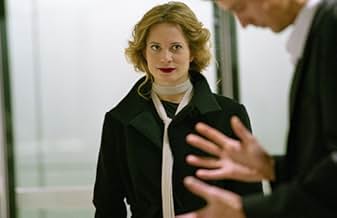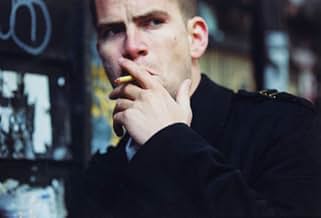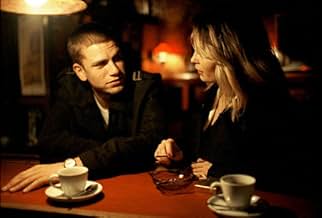AVALIAÇÃO DA IMDb
7,3/10
7,7 mil
SUA AVALIAÇÃO
Adicionar um enredo no seu idiomaA young man who thought himself already in love with a nice girl is drawn into a literary drama when he is captured by a deep and stimulating love affair.A young man who thought himself already in love with a nice girl is drawn into a literary drama when he is captured by a deep and stimulating love affair.A young man who thought himself already in love with a nice girl is drawn into a literary drama when he is captured by a deep and stimulating love affair.
- Direção
- Roteiristas
- Artistas
- Prêmios
- 12 vitórias e 11 indicações no total
Carlos Claro Schelin
- Mercedes Sand
- (as Mercedes Claro Schelin)
Line Søndergaard Poulsen
- Girl in metro station
- (não creditado)
- Direção
- Roteiristas
- Elenco e equipe completos
- Produção, bilheteria e muito mais no IMDbPro
Avaliações em destaque
First things first: I find pointless to summarize the plot, therefore I'll stick to my own thoughts about it.
Grainy fade-outs, near-flawless performances, mind-gripping in its non-linear simplicity plot, endless possibilities (if you are prone to indulging in analysis) and a precise, clean-cut overall aspect- are all there, in Boe's beautiful, if slightly formal, first long feature.
This film dodges, quite effortlessly, the one major shortcoming (if you ask me)of Last Year In Marienbad, to which it has been compared; unlike the former, Reconstruction manages, through unmistakably warm-bloodied and wrapped in smoke actors'performances, to surpass the cartoonish, slightly de-humanized concept that pervades Resnais's (i dare utter the word) masterpiece. In other words, the characters are a significant little more than archetypes, they are individuals. Subsequently, the three A's (Alex, Aimee-stunning Marie Bonnevie- and August) stir vaguely-rooted emotions in the spectator, aided by the 3-dimensionality of their acting and enhanced by innumerable, purposeful close-ups and near-perfectly-fitted music.
The intelligent rather than inventive script receives "thumbs up" not for itself but for its glossy, yet not sultry, rendition by often unbearably beautiful shots. Also, the demure approach to sexuality speaks volumes about the power of the camera&actors unity to suggest powerful feelings.
The coherent-enough story (don't let yourselves taken in by deceptive ambiguity) escapes down-and-out moronic de-constructivism for its own sake, allowing thus the average movie-goer to suck the film in, irrespective of his cultural background.
Although data about the characters arrives in dribs and drabs, the film is carefully plotted and succeeds in keeping the spectator's interest up till the end. August, in spite of apparent filmic omnipotence, is bare-handed against the efficiency of tender, scintillating and dizzying love story; the real puppeteer is the director, through his double, the cigarette-levitating, literal charmer, who pulls the strings in this bittersweet faerie. So, once you've learned the ropes of his editing choices and non-linear story ( the 3 possibilities/photos the woman has and other details), which require at least one viewing, Reconstruction becomes more than a feast for the eye. It allows a sensitive insight into a terribly fragile dreamlike world: Orpheus is supposed never to doubt the flesh-and-bone unseen certainty of being followed by Euridice on their way out of the Inferno. The visually enticing, effective portraying of Alex and Aimee's every movement offers precious glimpses of their innermost thoughts.
Speaking flaws, a restraint from taking risks in points of frame composition (aka predictable angles, never going off the beaten track) is quite obvious BUT it actually seems reassuring. Also, the absence of a clear message might affect the appreciation of a part of the public, BUT this is small concern for the director, whose primary aim (stated in August's voice off, in the beginning) is not to convey a moral attitude or a manifesto, but to ease pure delight on the spectators. Nevertheless, the I-cannot-relate-to-it factor breeds suspicion as to the actual relevance of what we see = Why should I care? Meaning, this seemingly inconsequential display of beautiful shots and silences can't extend its influence beyond the immediacy of the 90min viewing. BUT this is highly-debatable, if you take into account different responses from different people.
What I've just said about Reconstruction is hopefully not a gratuitous eulogy, but a considerate comment on what seemed to me a remarkably 'polished' if visually engrossing experience. Throughout the film, one gets the impression of intruding, of being a nosy Parker in an almost perfect, smoothly-trimmed, classy-as-heaven human landscape. Not an emotionless cine-verite, not a sweeping melodrama, not a frowningly guru-ish food-for-thought crap, Reconstitution proves warm enough to be cherished, praiseworthy in terms of cinematography, an outstanding and promising debut.
Grainy fade-outs, near-flawless performances, mind-gripping in its non-linear simplicity plot, endless possibilities (if you are prone to indulging in analysis) and a precise, clean-cut overall aspect- are all there, in Boe's beautiful, if slightly formal, first long feature.
This film dodges, quite effortlessly, the one major shortcoming (if you ask me)of Last Year In Marienbad, to which it has been compared; unlike the former, Reconstruction manages, through unmistakably warm-bloodied and wrapped in smoke actors'performances, to surpass the cartoonish, slightly de-humanized concept that pervades Resnais's (i dare utter the word) masterpiece. In other words, the characters are a significant little more than archetypes, they are individuals. Subsequently, the three A's (Alex, Aimee-stunning Marie Bonnevie- and August) stir vaguely-rooted emotions in the spectator, aided by the 3-dimensionality of their acting and enhanced by innumerable, purposeful close-ups and near-perfectly-fitted music.
The intelligent rather than inventive script receives "thumbs up" not for itself but for its glossy, yet not sultry, rendition by often unbearably beautiful shots. Also, the demure approach to sexuality speaks volumes about the power of the camera&actors unity to suggest powerful feelings.
The coherent-enough story (don't let yourselves taken in by deceptive ambiguity) escapes down-and-out moronic de-constructivism for its own sake, allowing thus the average movie-goer to suck the film in, irrespective of his cultural background.
Although data about the characters arrives in dribs and drabs, the film is carefully plotted and succeeds in keeping the spectator's interest up till the end. August, in spite of apparent filmic omnipotence, is bare-handed against the efficiency of tender, scintillating and dizzying love story; the real puppeteer is the director, through his double, the cigarette-levitating, literal charmer, who pulls the strings in this bittersweet faerie. So, once you've learned the ropes of his editing choices and non-linear story ( the 3 possibilities/photos the woman has and other details), which require at least one viewing, Reconstruction becomes more than a feast for the eye. It allows a sensitive insight into a terribly fragile dreamlike world: Orpheus is supposed never to doubt the flesh-and-bone unseen certainty of being followed by Euridice on their way out of the Inferno. The visually enticing, effective portraying of Alex and Aimee's every movement offers precious glimpses of their innermost thoughts.
Speaking flaws, a restraint from taking risks in points of frame composition (aka predictable angles, never going off the beaten track) is quite obvious BUT it actually seems reassuring. Also, the absence of a clear message might affect the appreciation of a part of the public, BUT this is small concern for the director, whose primary aim (stated in August's voice off, in the beginning) is not to convey a moral attitude or a manifesto, but to ease pure delight on the spectators. Nevertheless, the I-cannot-relate-to-it factor breeds suspicion as to the actual relevance of what we see = Why should I care? Meaning, this seemingly inconsequential display of beautiful shots and silences can't extend its influence beyond the immediacy of the 90min viewing. BUT this is highly-debatable, if you take into account different responses from different people.
What I've just said about Reconstruction is hopefully not a gratuitous eulogy, but a considerate comment on what seemed to me a remarkably 'polished' if visually engrossing experience. Throughout the film, one gets the impression of intruding, of being a nosy Parker in an almost perfect, smoothly-trimmed, classy-as-heaven human landscape. Not an emotionless cine-verite, not a sweeping melodrama, not a frowningly guru-ish food-for-thought crap, Reconstitution proves warm enough to be cherished, praiseworthy in terms of cinematography, an outstanding and promising debut.
Is this a true, fictional narrative, or is it the figment of the fictional writer's imagination? If that sounds contradictory, then it gives you some inkling about the substance or lack thereof of this most confusing and yet most intriguing film.
Is this a film about filming a narrative? Is it a film about two narratives one real fiction, one imaginary fiction? Or, is it simply a film designed to act as a metaphor for the total uncertainty about human relationships? Perhaps, it's all three... or simply an illusion?
As it unfolds, we meet a very confused young man, Alex (Nikolaj Lei Kaas) who seems to be in love with the same woman who exists in two different realities and, yet, who co-exist in the same city. On the one hand, Alex is associated with Simone (Maria Bonnevie) definitely and yet, he meets another woman, Aimee (again, Maria Bonnevie), who looks exactly like Simone, in another part of town.
Whereas Simone is definitely single, Aimee is apparently married to August, a writer who is in town to give some lectures on the art of writing. At the same time, August is also trying to finish his novel that is a love story, but he's having trouble trying to decide what "the young man" of his story should do and he tells Aimee about his dilemma while they sit in their hotel room.
So, while August is discussing the progress of his narrative with his publisher, Monica (Ida Dwinger), young Alex is roaming all over the city trying to understand how it is that both women appear to know him for some of the time, and at other times, he appears to be a stranger to them. Frantically, he rushes from café, to a bar, to a restaurant, to another bar, desperately trying to come to grips with his concept of his reality which, oddly enough, doesn't appear to jive with the reality of anybody that Alex thinks he knows...
Totally confused now? Well, you should be, because I think Reconstruction is an experimental film that tries to show just how confusing every person's sense of their own reality must be not only for each person, but to others around them also.
You think you really, really know your girlfriend, your wife, your boyfriend, your husband, your lover? This film, I think, forces you to reflect (no pun intended) upon that existential problem, a very real problem for every living person, whether or not we know it. The camera work is also experimental, and some of it is quite original in its construction. You'll know what I mean when you see it that is, if you're prepared to watch it.
Definitely not a film for action fans or the 'braindead'.
Is this a film about filming a narrative? Is it a film about two narratives one real fiction, one imaginary fiction? Or, is it simply a film designed to act as a metaphor for the total uncertainty about human relationships? Perhaps, it's all three... or simply an illusion?
As it unfolds, we meet a very confused young man, Alex (Nikolaj Lei Kaas) who seems to be in love with the same woman who exists in two different realities and, yet, who co-exist in the same city. On the one hand, Alex is associated with Simone (Maria Bonnevie) definitely and yet, he meets another woman, Aimee (again, Maria Bonnevie), who looks exactly like Simone, in another part of town.
Whereas Simone is definitely single, Aimee is apparently married to August, a writer who is in town to give some lectures on the art of writing. At the same time, August is also trying to finish his novel that is a love story, but he's having trouble trying to decide what "the young man" of his story should do and he tells Aimee about his dilemma while they sit in their hotel room.
So, while August is discussing the progress of his narrative with his publisher, Monica (Ida Dwinger), young Alex is roaming all over the city trying to understand how it is that both women appear to know him for some of the time, and at other times, he appears to be a stranger to them. Frantically, he rushes from café, to a bar, to a restaurant, to another bar, desperately trying to come to grips with his concept of his reality which, oddly enough, doesn't appear to jive with the reality of anybody that Alex thinks he knows...
Totally confused now? Well, you should be, because I think Reconstruction is an experimental film that tries to show just how confusing every person's sense of their own reality must be not only for each person, but to others around them also.
You think you really, really know your girlfriend, your wife, your boyfriend, your husband, your lover? This film, I think, forces you to reflect (no pun intended) upon that existential problem, a very real problem for every living person, whether or not we know it. The camera work is also experimental, and some of it is quite original in its construction. You'll know what I mean when you see it that is, if you're prepared to watch it.
Definitely not a film for action fans or the 'braindead'.
It took me nearly 15 minutes to get into this movie. But (gladly!) once it grasped me, there was no turning back. This is an 'existential angst' inspired masterpiece; a movie with more questions than answers. And, it was also a movie that, quite frankly, I wished hadn't ended so soon. Yes... I definitely enjoyed it that much! 'Reconstruction' was as psychologically perplexing as it was beautifully haunting. And I now find it hard to fault it. So... I won't.
However, as is the case with most of the movies I adore, I doubt that all people would concur with my estimation. That being said, it would definitely appeal to someone who enjoyed Memento; or maybe even Irreversible.
The core theme explored in this movie is that of knowing oneself and those close to you: Appearance versus reality. The true existentialist never finds profound comfort in the purportedly comfortable. For there are often surprises to be found on deeper reflection... I shall say no more. But if you've just digested a couple of chapters of 'Being & Nothingness', I could think of few better ways to further lose yourself in the problems of the mind and existence, than to watch this film afterwards.
The acting, screenplay, direction, score, filming and production all very much made the grade. Overall, Reconstruction is a psychologically challenging movie that any thinker should profoundly enjoy (once, that is, one gets into the psychological mysteries which unfold). Albeit, to paraphrase another reviewer: the intellectually challenged, and/or those who need all questions resolved in any movie, should hastily move along to another film.
However, as is the case with most of the movies I adore, I doubt that all people would concur with my estimation. That being said, it would definitely appeal to someone who enjoyed Memento; or maybe even Irreversible.
The core theme explored in this movie is that of knowing oneself and those close to you: Appearance versus reality. The true existentialist never finds profound comfort in the purportedly comfortable. For there are often surprises to be found on deeper reflection... I shall say no more. But if you've just digested a couple of chapters of 'Being & Nothingness', I could think of few better ways to further lose yourself in the problems of the mind and existence, than to watch this film afterwards.
The acting, screenplay, direction, score, filming and production all very much made the grade. Overall, Reconstruction is a psychologically challenging movie that any thinker should profoundly enjoy (once, that is, one gets into the psychological mysteries which unfold). Albeit, to paraphrase another reviewer: the intellectually challenged, and/or those who need all questions resolved in any movie, should hastily move along to another film.
I saw this movie at the London Film Festival, introduced by Boe the director and the beautiful Bonnevie, the lead actress. Boe is a graduate of the Danish film school and, as you might expect, the film is packed with movie references from Bergman to Hitchcock via Lynch. I hope the movie picks up a UK distributor as a second viewing is needed to understand the movie fully. On one viewing alone, this is an intelligent, intriguing and thought provoking movie with an excellent sense of time and place (Copenhagen, the present, even though no-one seems to have a mobile phone!), clever cinematography and editing and good performances. Boe creates a vision of Copenhagen as a labyrinthine, alien jungle where your front door may disappear and your friends have never seen you before.
Highly recommended
Highly recommended
"Reconstruction" is a clever, European take on "Unfaithful" where an older husband uses literary intellect instead of violence to attempt "The Revenge of the Cuckold."
But we have no idea how much is real or imagined or roman a clef or the character of the author is identifying too much with his alter ego, as we are told from the outset that what we will be seeing is the magic of the storyteller or puppeteer, watching as he manipulates his characters, trying out different situations in different drafts of a novel, erasing and playing out different scenarios of chance and choice, where art replaces the memory science of "Code 46."
I don't think I was the only audience member, however, who was rooting instead for the tall, dark, handsome young man as Nikolaj Lie Kaas has captivating chemistry with Maria Bonnevie (and I feel really foolish that I couldn't tell from either the film or the Danish credits until I looked at the IMDb listing that she plays both the jilted girlfriend and the adulterous wife).
The author makes some lame justifications about women needing love and men accidentally falling into it, or some such, that doesn't quite make sense and the film is supposed to be illustrating the point that a man has to learn about hurt as a price to be able to love. The author's self-understanding I suppose is illustrated by him reading his book's dedication to his wife in a desperate plea for her to forgive him all his inattention, etc. as he needs her for his art, so she shouldn't look for passion elsewhere.
But we're left more with the very powerful visuals of the different versions of how he imagined her possible affair could have started (a la "Brief Encounter") and its ramifications or concluded, and the feeling that the older guy was a smug deus ex machina.
In the things one can learn from the movies department: we also get a nice tour of Copenhagen-- people can smoke anywhere, even on the subway, and do, constantly; restaurant bathrooms have real terry cloth towels; the Hilton is really luxurious; Danes and Swedes don't seem to exchange cell hone numbers; and, like in "Italian for Beginners," Danes seem to think of Italy as the place to go for romance.
But we have no idea how much is real or imagined or roman a clef or the character of the author is identifying too much with his alter ego, as we are told from the outset that what we will be seeing is the magic of the storyteller or puppeteer, watching as he manipulates his characters, trying out different situations in different drafts of a novel, erasing and playing out different scenarios of chance and choice, where art replaces the memory science of "Code 46."
I don't think I was the only audience member, however, who was rooting instead for the tall, dark, handsome young man as Nikolaj Lie Kaas has captivating chemistry with Maria Bonnevie (and I feel really foolish that I couldn't tell from either the film or the Danish credits until I looked at the IMDb listing that she plays both the jilted girlfriend and the adulterous wife).
The author makes some lame justifications about women needing love and men accidentally falling into it, or some such, that doesn't quite make sense and the film is supposed to be illustrating the point that a man has to learn about hurt as a price to be able to love. The author's self-understanding I suppose is illustrated by him reading his book's dedication to his wife in a desperate plea for her to forgive him all his inattention, etc. as he needs her for his art, so she shouldn't look for passion elsewhere.
But we're left more with the very powerful visuals of the different versions of how he imagined her possible affair could have started (a la "Brief Encounter") and its ramifications or concluded, and the feeling that the older guy was a smug deus ex machina.
In the things one can learn from the movies department: we also get a nice tour of Copenhagen-- people can smoke anywhere, even on the subway, and do, constantly; restaurant bathrooms have real terry cloth towels; the Hilton is really luxurious; Danes and Swedes don't seem to exchange cell hone numbers; and, like in "Italian for Beginners," Danes seem to think of Italy as the place to go for romance.
Você sabia?
- Citações
Narrator: It is a film. Everything is constructed. Still it hurts.
- ConexõesFeatured in Trier, Kidman og Cannes (2003)
- Trilhas sonorasAdagio for Strings
by Samuel Barber
Principais escolhas
Faça login para avaliar e ver a lista de recomendações personalizadas
- How long is Reconstruction?Fornecido pela Alexa
Detalhes
- Data de lançamento
- País de origem
- Idiomas
- Também conhecido como
- Reconstruction
- Locações de filme
- Le Sommelier, Bredgade, Copenhage, Dinamarca(restaurant)
- Empresas de produção
- Consulte mais créditos da empresa na IMDbPro
Bilheteria
- Faturamento bruto nos EUA e Canadá
- US$ 73.516
- Fim de semana de estreia nos EUA e Canadá
- US$ 13.629
- 12 de set. de 2004
- Faturamento bruto mundial
- US$ 471.107
- Tempo de duração1 hora 32 minutos
- Cor
- Mixagem de som
- Proporção
- 2.35 : 1
Contribua para esta página
Sugerir uma alteração ou adicionar conteúdo ausente


























